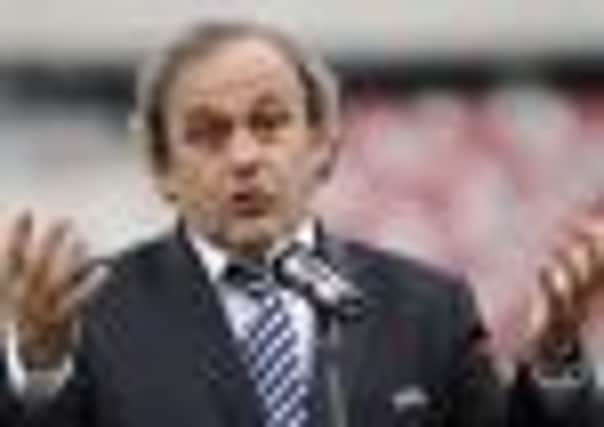UEFA get tough on racism with finals warning


UEFA president Michel Platini confirmed the rule preventing players from leaving the field without the referee’s permission would stand – even if they are the victims of racism from the stands in Poland and Ukraine.
Mario Balotelli last week threatened to walk off if he suffered racist abuse during Italy’s Euro 2012 games, but Platini said the Manchester City striker would be punished for doing so unless the officials stopped the game.
Advertisement
Hide AdAdvertisement
Hide Ad“It’s a yellow card,” said Platini at the tournament’s kick-off press conference in Warsaw, which was dominated by the issue of racism.
“We’d certainly support the referee if he decided to stop the game.
“It’s not a player, Mr Balotelli, who’s in charge of refereeing. It’s the referee who takes these decisions.
“So, the referee has been given advice and he can stop the game if there are problems.
Advertisement
Hide AdAdvertisement
Hide Ad“We will stop the game if there are problems because I think racism is the worst of this.”
UEFA’s chief refereeing officer, Pierluigi Collina, insisted each of the qualified teams had been made aware of the process they should follow if one of their players were abused.
“Things are clear,” he said, confirming officials had also been fully briefed.
“Referees have a protocol so they know what they have to do.
Advertisement
Hide AdAdvertisement
Hide Ad“The match director, who is responsible for each match, knows what has to be done on the field of play.”
Problems with racist and anti-semitic abuse at football matches in Poland and Ukraine were highlighted in last week’s BBC Panorama programme.
The families of England stars Theo Walcott and Alex Oxlade-Chamberlain have chosen not to attend the tournament over fears for their safety, while former international Sol Campbell warned black fans who do travel that they risk “coming back in a coffin”.
Platini, who became increasingly irritated about the line of questioning, refused to be drawn on Campbell’s comments.
Advertisement
Hide AdAdvertisement
Hide AdHe said: “What would you like me to say? How would you want me to answer this?
“Everyone can do what they like.”
The former France great added: “I don’t think there’s any more racism in Poland and Ukraine than in France or anywhere else, or even in England.
“It’s not a footballing problem. It’s a problem for society.
“I’m not in charge of what goes on in football stadiums. It’s the states that need to take charge of this.
Advertisement
Hide AdAdvertisement
Hide Ad“There have been problems with violence in the 1970s in England.
“They made great strides actually to change the situation and we need to do work in the field of racism and we need to stop this from happening.
“How can you say outside the stadium, ‘He’s a racist, he can’t come in, he’s not a racist, he can come in’? You can’t do it.”
Piara Powar, the executive director of Football Against Racism in Europe (FARE), was confident UEFA would not hesitate to expel teams from the tournament if necessary.
Advertisement
Hide AdAdvertisement
Hide Ad“For us, the UEFA system is three strikes and you’re out,” he said. “Fine and then another fine and then a ban or forcing teams to play behind closed doors.
“If the system is in full effect, we could have a team kicked out of the competition for far-right banners.”
He added: “There is no question we are worried about this tournament more than any other.
“I think Platini understands what is going on.
“There is actually a process in place where we have 31 independent international monitors.
Advertisement
Hide AdAdvertisement
Hide Ad“It is the job of these guys not to just look out for the obvious racism but the nuanced issues.
“It is certainly not the job of the referee to pick out banners and discriminatory chants.”
Football Association chairman David Bernstein last night refused to discuss the absence of Rio Ferdinand, claiming England did not want to get sidetracked by “historical extraneous issues”.
Ferdinand’s absence from the 23-man squad that flew into Krakow last night has been a major talking point since manager Roy Hodgson chose to replace injured defender Gary Cahill with Liverpool youngster Martin Kelly on Monday.
Advertisement
Hide AdAdvertisement
Hide AdThe move prompted a vicious reaction from the Ferdinand camp, who believe, like many others, that the 33-year-old’s omission had nothing to do with “football reasons” as Hodgson previously stated, and everything to do with worries about how the defender would interact with John Terry.
Hodgson is yet to speak about the matter, and there are no plans for him to talk to the media until the weekend.
Instead, on a walk around Krakow’s attractive main square a couple of hours after arrival, Bernstein rebuffed repeated questions and seemed to sweep Ferdinand’s 81-cap career away.
“We’re here to talk about the tournament, about the 23 players who are here and I’m not prepared to discuss – at all – any players who are not here,” he said.
Advertisement
Hide AdAdvertisement
Hide Ad“It might be an issue – but it’s an issue I’m happy to talk about when the tournament is over maybe.
“We are here to talk about the tournament and about the future and that’s it.”
As Bernstein sat next to Hodgson on the flight from Luton, it must be assumed the pair were in agreement over how to handle the Ferdinand issue. Yet the problem is nothing to do with Ferdinand’s absence, more the reasons given for it, and a feeling the defender is suffering from a situation that does not involve him.
Parker’s hopes: Page 23.